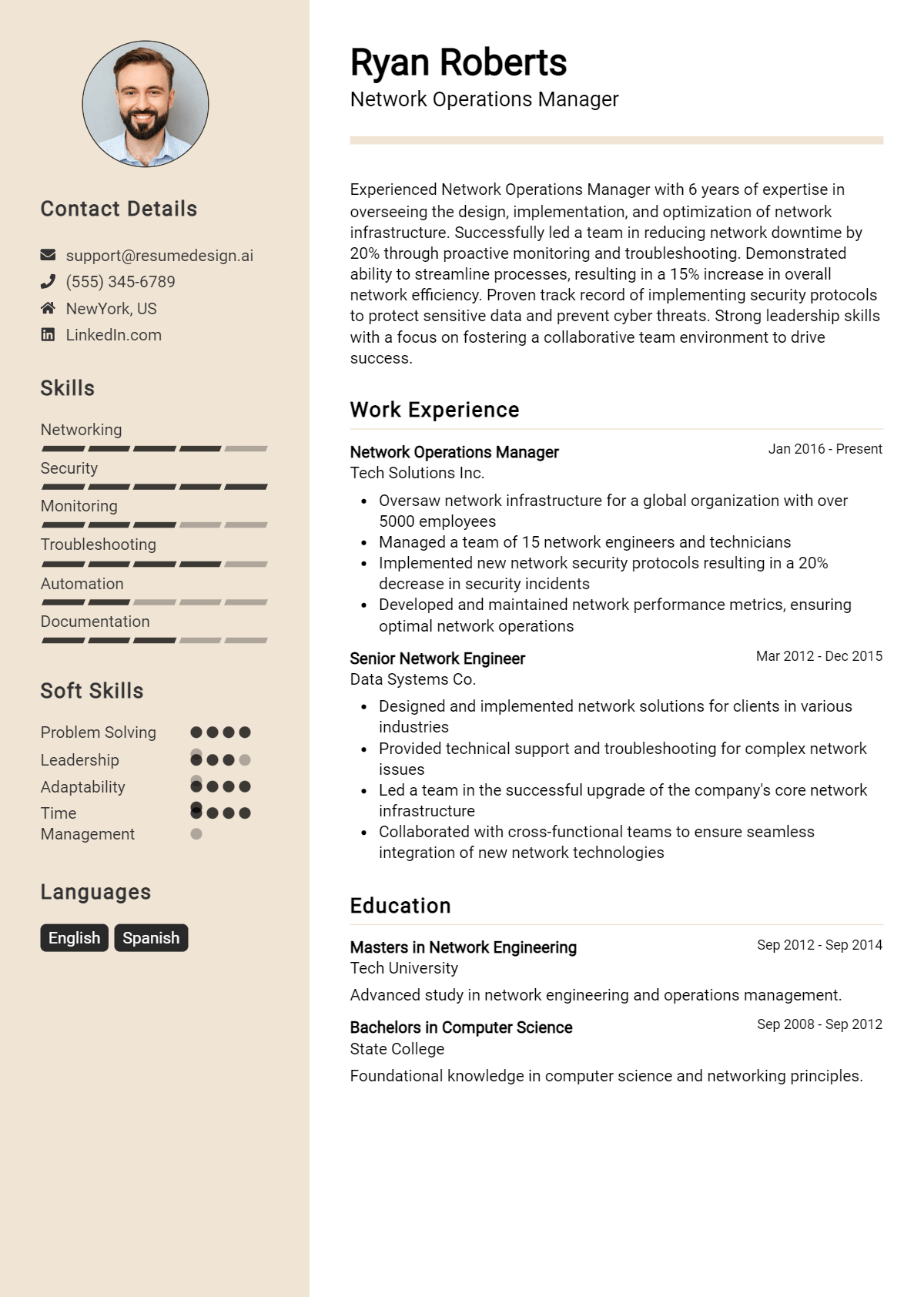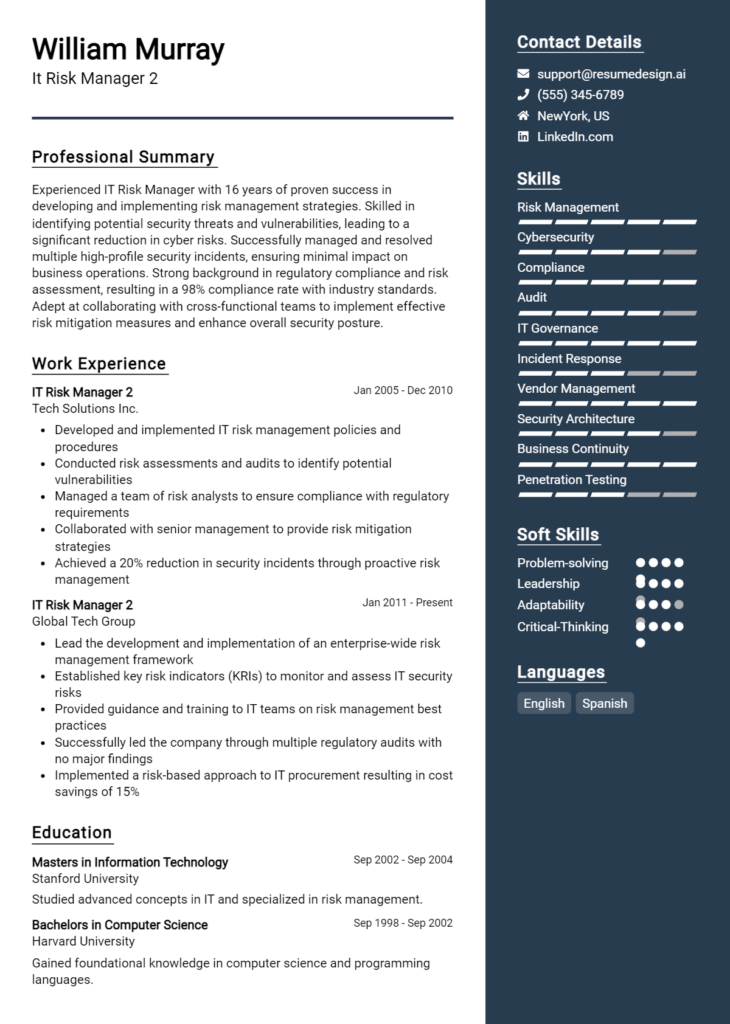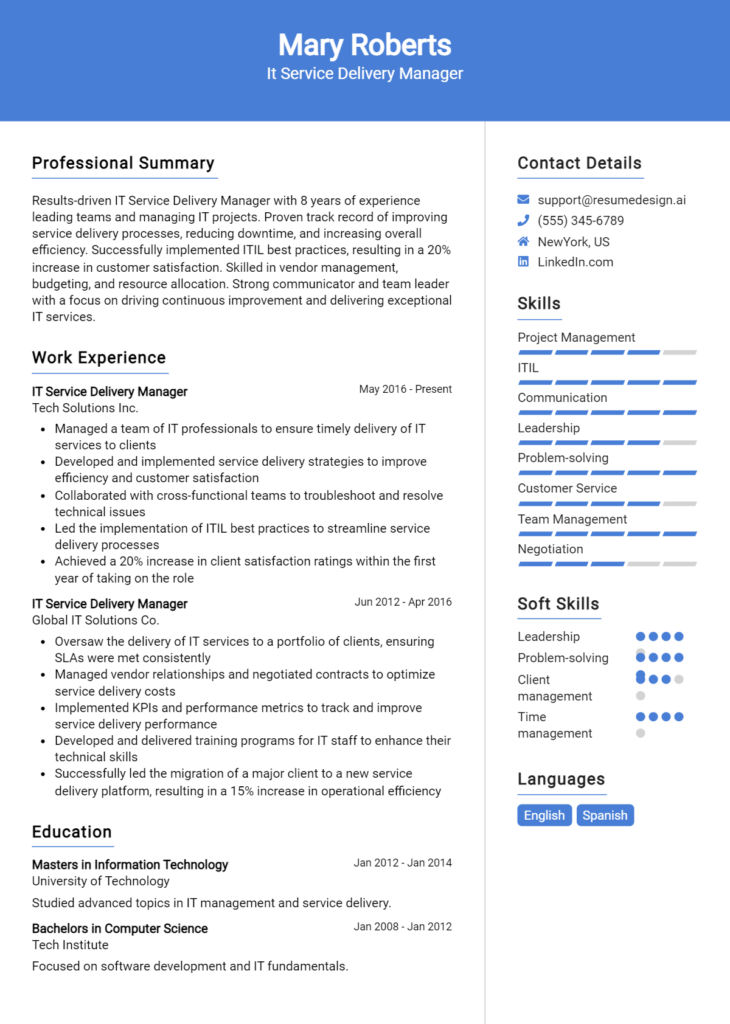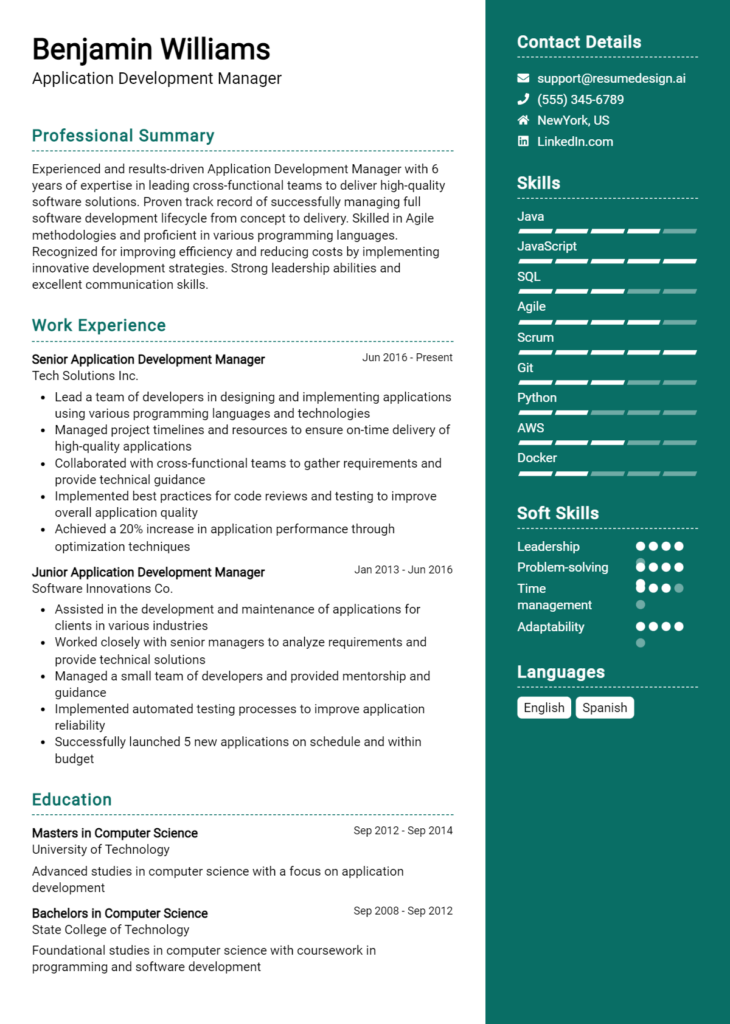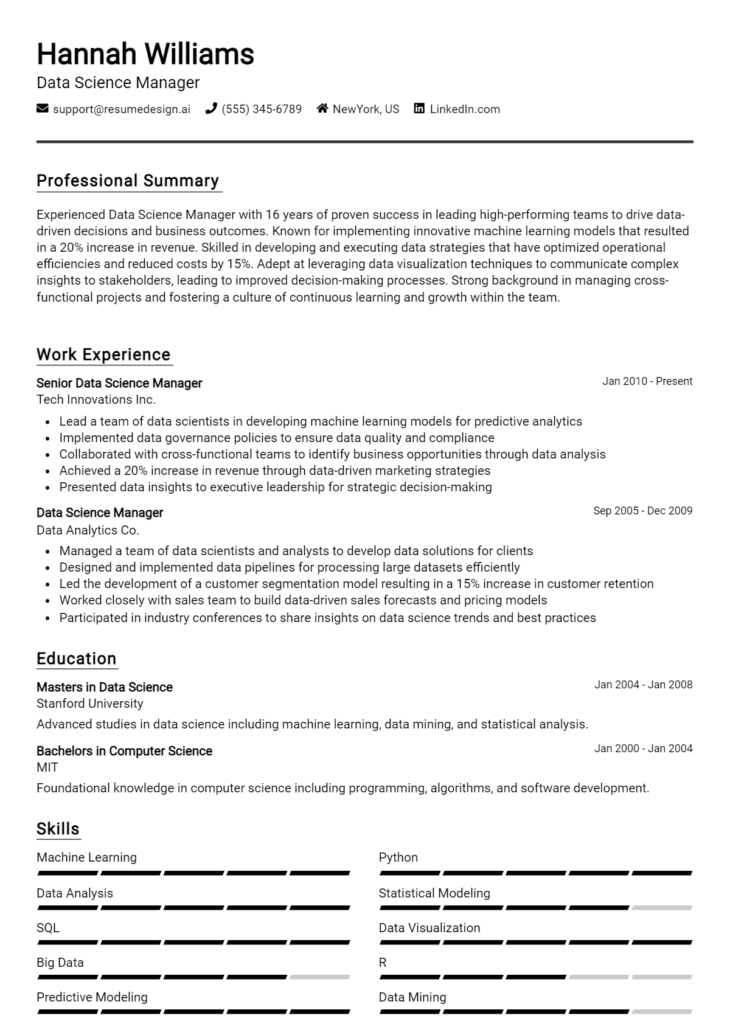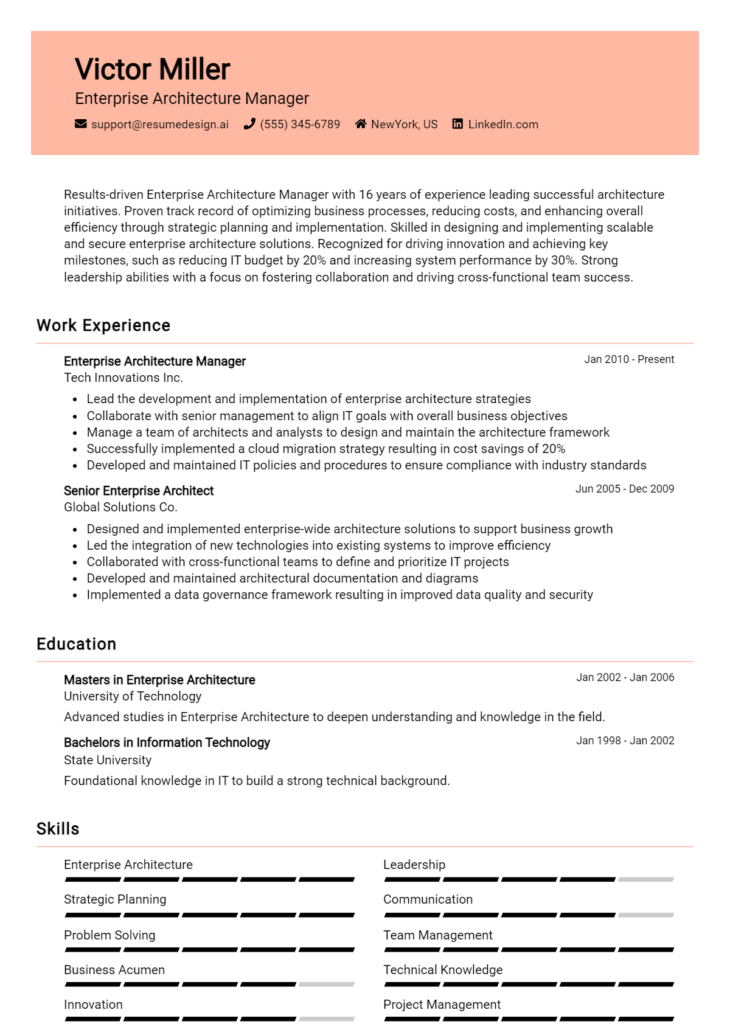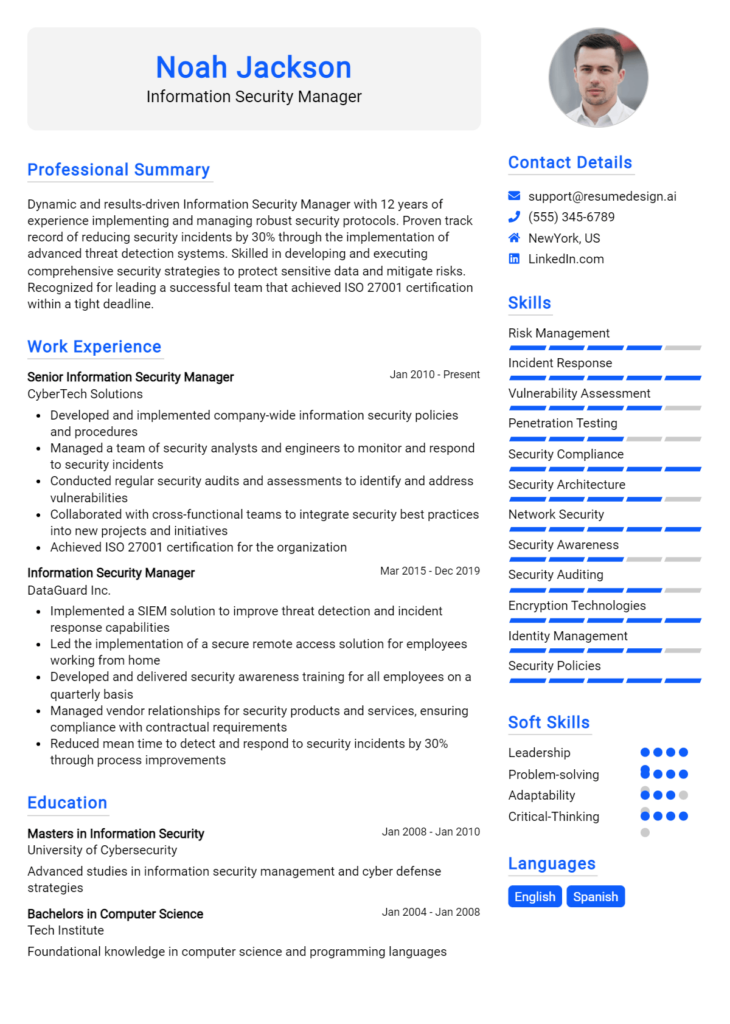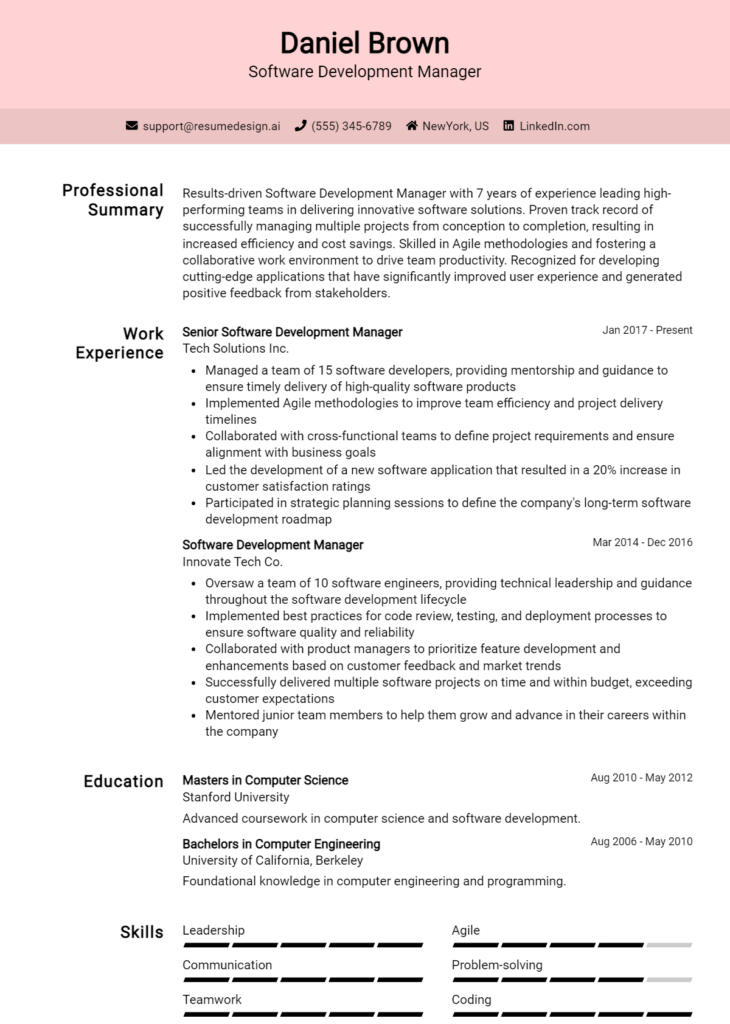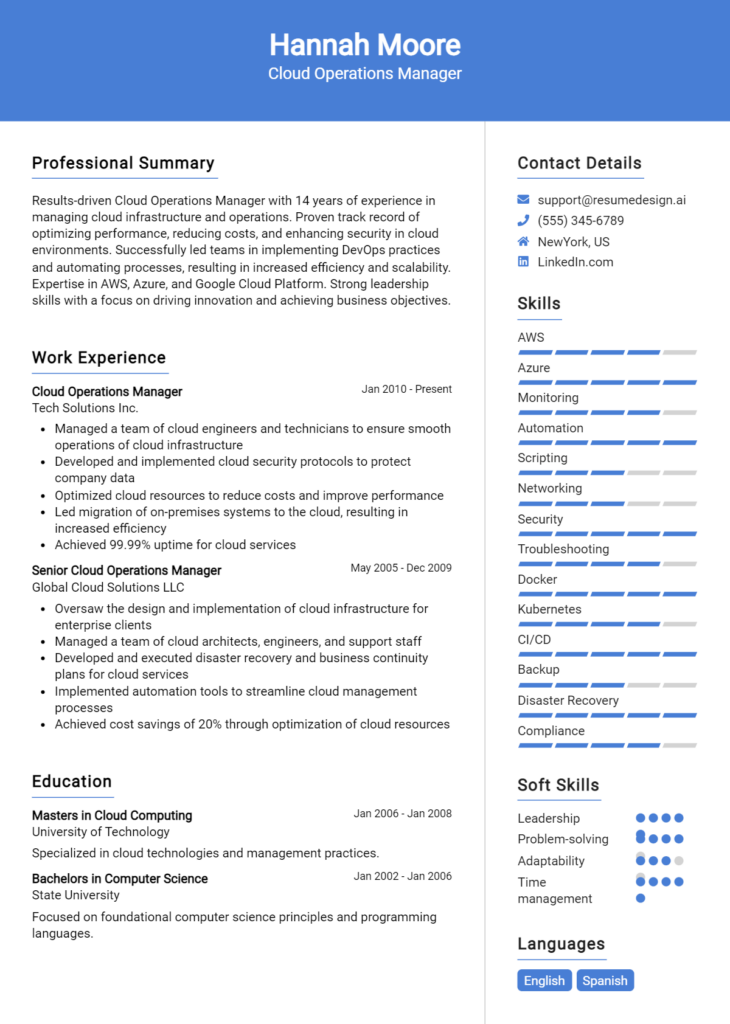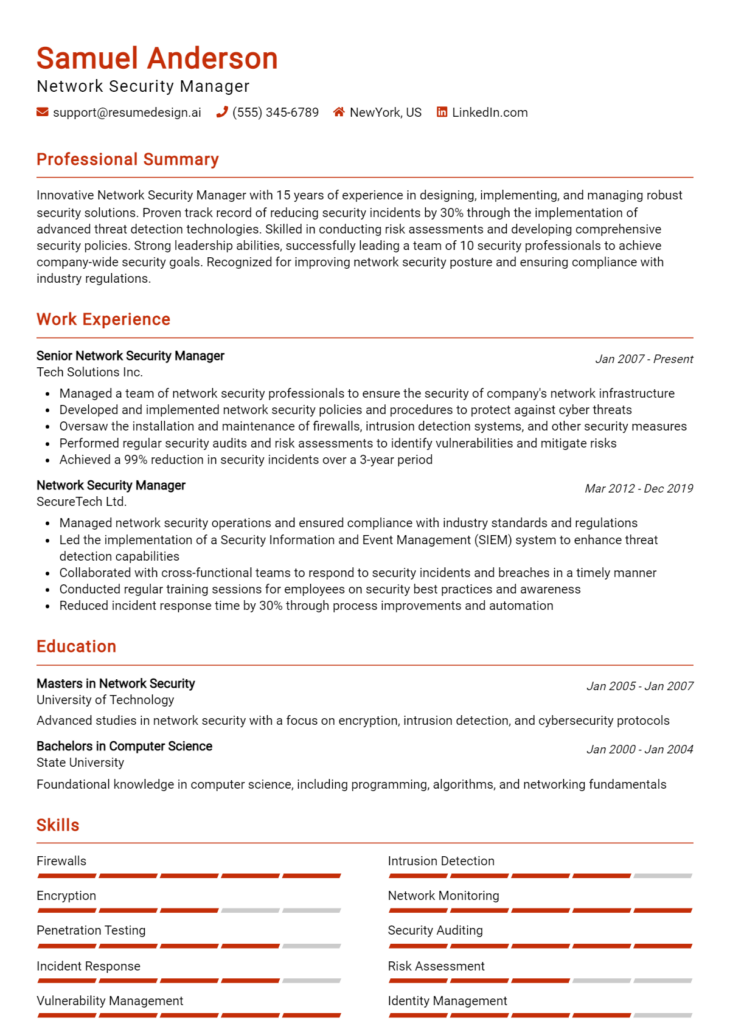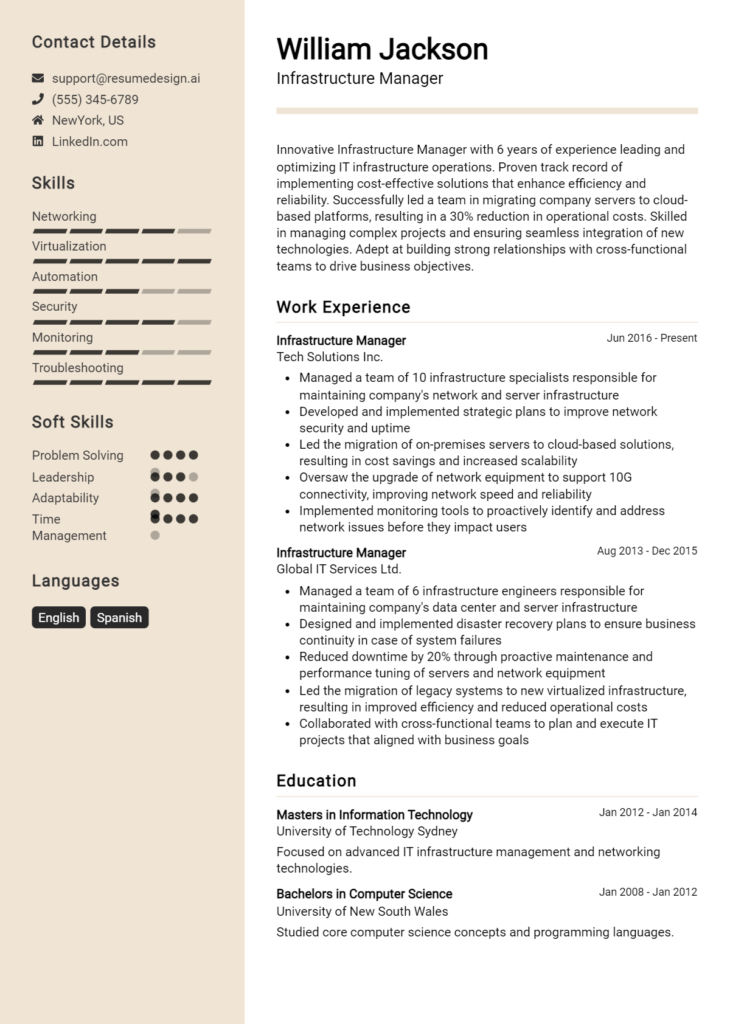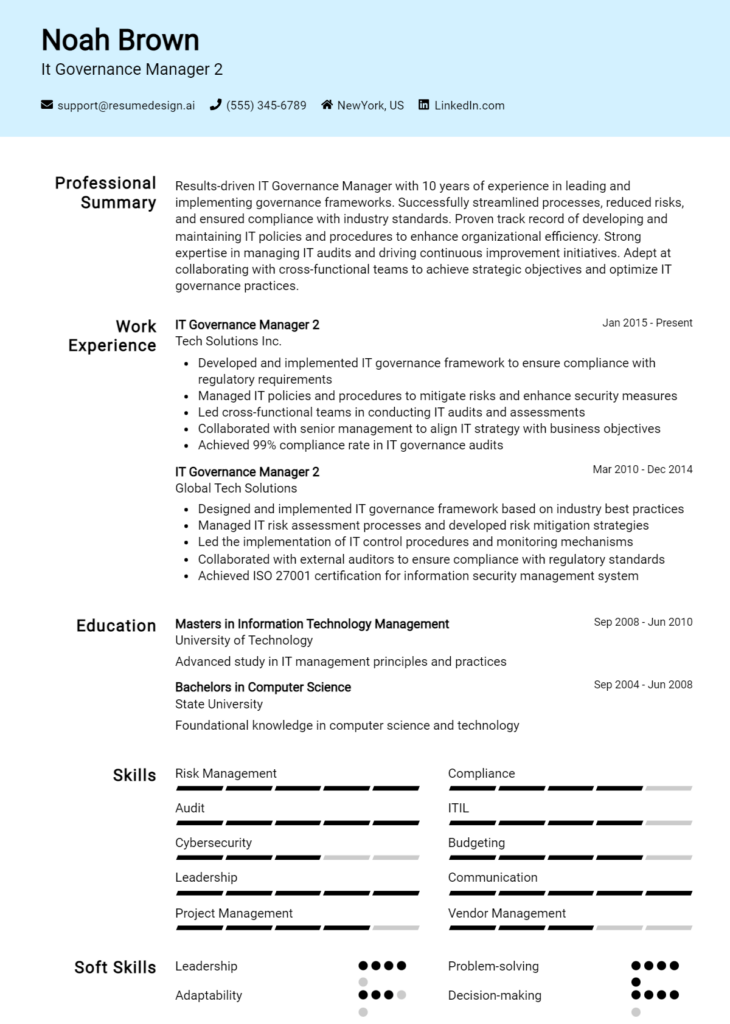Network Operations Manager Core Responsibilities
The Network Operations Manager plays a crucial role in overseeing the stability and efficiency of an organization's network infrastructure. This professional bridges various departments by ensuring seamless communication and collaboration between IT, security, and operational teams. Key responsibilities include monitoring network performance, troubleshooting issues, and implementing security measures. Essential skills encompass technical expertise, operational acumen, and strong problem-solving abilities, which are vital for achieving organizational goals. A well-structured resume can effectively highlight these qualifications, showcasing a candidate's potential impact on network reliability and business success.
Common Responsibilities Listed on Network Operations Manager Resume
- Oversee daily network operations and performance monitoring.
- Manage network infrastructure and design improvements.
- Implement and maintain security protocols and measures.
- Troubleshoot and resolve network issues promptly.
- Coordinate with cross-functional teams to ensure network alignment with business objectives.
- Develop and enforce network policies and procedures.
- Conduct regular network assessments and audits.
- Prepare detailed reports on network performance and incidents.
- Lead network upgrade and migration projects.
- Train and mentor junior network staff.
- Stay updated on emerging technologies and industry trends.
- Manage vendor relationships and negotiate contracts for services.
High-Level Resume Tips for Network Operations Manager Professionals
In today’s competitive job market, a well-crafted resume is essential for Network Operations Manager professionals looking to make a strong first impression on potential employers. This document serves as the candidate's introduction, showcasing not only their skills but also their achievements in the field of network operations. Given the technical and managerial nature of this role, it is crucial for the resume to reflect a deep understanding of industry-specific practices and to convey a track record of success. In this guide, we will provide practical and actionable resume tips specifically tailored for Network Operations Manager professionals, helping them to stand out in the hiring process.
Top Resume Tips for Network Operations Manager Professionals
- Tailor your resume to each job application by incorporating keywords from the job description.
- Highlight relevant experience, focusing on roles that involved network management, operations, and team leadership.
- Quantify your achievements with metrics, such as network uptime percentages, cost savings, or efficiency improvements.
- Showcase industry-specific skills, including proficiency in networking protocols, troubleshooting techniques, and management tools.
- Include certifications, such as CCNA, CCNP, or ITIL, to demonstrate your qualifications and commitment to professional development.
- Utilize a clean, professional format that is easy to read, ensuring that key information stands out.
- Provide a summary statement at the top of your resume that encapsulates your experience and career objectives.
- Incorporate keywords related to soft skills, such as leadership, communication, and problem-solving, to demonstrate your managerial capabilities.
- List any relevant projects or initiatives you spearheaded, detailing your role and the outcomes achieved.
By implementing these tips, Network Operations Manager professionals can significantly increase their chances of landing a job in the field. A well-structured and targeted resume not only highlights the candidate's qualifications but also conveys their commitment to excellence, making them a more attractive candidate to potential employers.
Why Resume Headlines & Titles are Important for Network Operations Manager
In the competitive field of network operations management, crafting a resume that stands out is essential. A well-structured resume headline or title serves as the first impression a hiring manager will have of a candidate, acting as a concise summary that encapsulates key qualifications and expertise. A strong headline can immediately grab attention, showcasing a candidate's relevant experience and skills in a single impactful phrase. It is crucial that this element is not only concise but also directly relevant to the position being applied for, ensuring that it resonates with what the hiring manager is seeking.
Best Practices for Crafting Resume Headlines for Network Operations Manager
- Keep it concise; aim for one impactful sentence or phrase.
- Use specific terminology relevant to the network operations field.
- Highlight key achievements or skills that are directly related to the job.
- Avoid jargon and vague language; clarity is key.
- Tailor the headline to match the job description and requirements.
- Incorporate metrics or accomplishments to demonstrate impact.
- Use action-oriented language to convey a proactive attitude.
- Ensure proper capitalization and formatting for a professional appearance.
Example Resume Headlines for Network Operations Manager
Strong Resume Headlines
Accomplished Network Operations Manager with 10+ Years of Experience in Enhancing Network Performance
Results-Driven Network Operations Leader Specializing in Network Security and Infrastructure Optimization
Expert in Leading Cross-Functional Teams to Drive Network Efficiency and Minimize Downtime
Dynamic Network Operations Manager with Proven Track Record in Managing Large-Scale Network Deployments
Weak Resume Headlines
Network Manager Seeking New Opportunities
Experienced Professional in IT
Looking for a Job in Network Operations
The strong headlines presented above are effective because they provide specific details that highlight the candidate's experience, skills, and achievements in network operations management. They immediately communicate value and relevance to the hiring manager, making it clear why the candidate is a suitable fit for the role. In contrast, the weak headlines fail to impress due to their vagueness and lack of specificity; they do not convey the candidate's unique qualifications or how they align with the needs of the employer, resulting in a missed opportunity to capture interest.
Writing an Exceptional Network Operations Manager Resume Summary
Writing a compelling resume summary is essential for a Network Operations Manager as it serves as the first impression to hiring managers. A strong summary quickly captures attention by highlighting key skills, relevant experience, and significant accomplishments that align with the job role. It should be concise yet impactful, demonstrating a clear understanding of the position and the unique value the candidate brings. By tailoring the summary to the specific job they are applying for, candidates can effectively communicate their fit for the role and increase their chances of being noticed in a competitive job market.
Best Practices for Writing a Network Operations Manager Resume Summary
- Quantify Achievements: Use numbers to showcase the impact of your contributions, such as percentage improvements in network uptime or cost reductions.
- Focus on Relevant Skills: Highlight key technical and managerial skills that are essential for a Network Operations Manager role.
- Tailor for the Job Description: Customize your summary to align with the specific responsibilities and qualifications outlined in the job posting.
- Be Concise: Aim for 3-5 sentences that encapsulate your expertise without unnecessary jargon.
- Showcase Leadership Experience: Emphasize any leadership roles or experiences in managing teams and projects.
- Include Industry-Specific Keywords: Use language and terms that are relevant to the networking industry to get past automated applicant tracking systems.
- Highlight Problem-Solving Skills: Mention specific examples of challenges faced and how you overcame them to improve operations.
- Use Action Verbs: Start sentences with dynamic verbs like "led," "developed," or "optimized" to convey a proactive approach.
Example Network Operations Manager Resume Summaries
Strong Resume Summaries
Results-driven Network Operations Manager with over 10 years of experience leading network optimization projects that increased system uptime by 30%. Proven expertise in managing cross-functional teams and implementing efficient processes that reduced operational costs by 20%.
Dynamic Network Operations Manager skilled in designing and deploying robust network infrastructures. Successfully managed a team of 15 engineers while maintaining SLA compliance and achieving a 95% customer satisfaction rate over the past 3 years.
Innovative Network Operations Manager with a track record of spearheading initiatives that improved network performance by 40%. Adept at leveraging advanced analytics to troubleshoot issues, streamline operations, and enhance service delivery in a fast-paced environment.
Weak Resume Summaries
Network Operations Manager with experience in networking. Looking for a new opportunity to grow my career.
Experienced in managing networks and working with teams. I am seeking to contribute my knowledge in a new role.
The strong resume summaries are effective because they provide specific, measurable outcomes, showcase relevant skills, and demonstrate a clear understanding of the Network Operations Manager role. In contrast, the weak summaries lack detail, fail to quantify achievements, and come across as generic, making it difficult for hiring managers to see the candidate's value or fit for the position.
Work Experience Section for Network Operations Manager Resume
The work experience section of a Network Operations Manager resume is crucial as it serves as a testament to the candidate's technical skills, leadership capabilities, and proficiency in delivering high-quality network solutions. This section not only highlights the candidate's hands-on experience in managing network operations but also provides tangible evidence of their impact on previous organizations. By quantifying achievements and aligning work experience with industry standards, candidates can effectively demonstrate their value to potential employers, making it essential for standing out in a competitive job market.
Best Practices for Network Operations Manager Work Experience
- Detail technical skills relevant to network operations, such as expertise in specific networking protocols and tools.
- Quantify achievements with metrics that demonstrate efficiency, cost savings, or improved performance.
- Showcase leadership experience by highlighting team management and project oversight.
- Align your experience with industry standards and best practices to show familiarity with current trends.
- Include examples of collaboration with cross-functional teams to illustrate communication skills.
- Highlight certifications or training relevant to network operations to establish credibility.
- Utilize action verbs to convey responsibility and impact in your previous roles.
- Tailor your work experience to the specific job description to enhance relevance.
Example Work Experiences for Network Operations Manager
Strong Experiences
- Successfully led a team of 15 network engineers to deploy a new enterprise-wide network infrastructure, resulting in a 30% increase in operational efficiency.
- Implemented a proactive monitoring system that reduced network downtime by 40%, saving the company an estimated $250,000 annually.
- Collaborated with cross-functional teams to design and execute a disaster recovery plan, achieving a recovery time objective (RTO) of under 2 hours.
- Managed a budget of $1 million for network operations, optimizing resource allocation and reducing costs by 20% through strategic vendor negotiations.
Weak Experiences
- Responsible for network operations.
- Assisted in projects related to network management.
- Worked with a team to improve network performance.
- Took part in budget discussions for network-related expenses.
The examples provided illustrate a clear distinction between strong and weak experiences. Strong experiences emphasize specific achievements and quantifiable results, demonstrating the candidate's direct impact on operations and team leadership. In contrast, weak experiences lack detail and measurable outcomes, making them less compelling to potential employers. Highlighting concrete accomplishments and responsibilities is crucial for showcasing a candidate's capabilities in the competitive field of network operations management.
Education and Certifications Section for Network Operations Manager Resume
The education and certifications section of a Network Operations Manager resume is crucial as it showcases the candidate's academic background and commitment to professional development. This section not only highlights relevant degrees and industry-recognized certifications but also underscores the candidate's dedication to continuous learning in a rapidly evolving technological landscape. By providing detailed information on relevant coursework, certifications, and specialized training, candidates can significantly enhance their credibility and demonstrate their alignment with the requirements of the role, making them more appealing to potential employers.
Best Practices for Network Operations Manager Education and Certifications
- Prioritize relevant degrees such as Computer Science, Information Technology, or Network Engineering.
- Include industry-recognized certifications like Cisco Certified Network Professional (CCNP), CompTIA Network+, or ITIL Foundation.
- Highlight any specialized training related to network security, cloud technologies, or project management.
- Provide details on relevant coursework that showcases expertise in networking, systems administration, and telecommunications.
- List certifications in chronological order, starting with the most recent to demonstrate continuous education.
- Tailor the section to the specific job description by emphasizing qualifications that match the company's needs.
- Ensure that all certifications listed are current and valid, reflecting ongoing professional development.
- Avoid including degrees or certifications that do not directly pertain to network operations or management roles.
Example Education and Certifications for Network Operations Manager
Strong Examples
- Bachelor of Science in Computer Networking, University of Technology, 2018
- Cisco Certified Network Professional (CCNP), 2022
- ITIL Foundation Certification, 2021
- Advanced Network Security Training, Cybersecurity Institute, 2023
Weak Examples
- Associate Degree in Fine Arts, Community College, 2015
- Outdated Microsoft Certified Systems Engineer (MCSE), 2010
- Certification in Basic Computer Skills, 2018
- High School Diploma, 2012 (without further qualifications or relevant experience)
The examples listed as strong effectively demonstrate relevant education and certifications that align with the responsibilities of a Network Operations Manager, showcasing recent achievements and specific industry credentials. In contrast, the weak examples illustrate outdated qualifications or irrelevant degrees that do not apply to the role, potentially detracting from the candidate's professionalism and suitability for the position. By focusing on strong examples, candidates can better position themselves for success in the competitive job market.
Top Skills & Keywords for Network Operations Manager Resume
In the competitive landscape of network management, a well-crafted resume for a Network Operations Manager must highlight a blend of essential skills. These skills not only demonstrate a candidate's technical expertise but also their ability to lead teams and manage complex projects effectively. A strong emphasis on both hard and soft skills can set a candidate apart from others, showcasing their proficiency in network technologies alongside their interpersonal abilities. By strategically incorporating these skills into their resumes, candidates can better align with the expectations of hiring managers and increase their chances of securing a position in this pivotal role.
Top Hard & Soft Skills for Network Operations Manager
Soft Skills
- Leadership
- Communication
- Problem-solving
- Teamwork
- Adaptability
- Time management
- Conflict resolution
- Critical thinking
- Decision-making
- Customer service orientation
- Emotional intelligence
- Negotiation skills
- Strategic planning
- Mentoring and coaching
- Attention to detail
Hard Skills
- Network architecture design
- Routing and switching protocols (e.g., BGP, OSPF)
- Firewall and security management
- Network monitoring tools (e.g., Nagios, SolarWinds)
- Cloud computing solutions (e.g., AWS, Azure)
- IP address management
- Virtualization technologies (e.g., VMware, Hyper-V)
- Troubleshooting and diagnostic skills
- Knowledge of networking hardware (e.g., routers, switches)
- Data center management
- VPN configuration and management
- Scripting and automation (e.g., Python, Bash)
- Compliance with networking standards (e.g., ISO, ITIL)
- Disaster recovery planning
- Performance optimization techniques
For more information on how to effectively highlight your skills and work experience, consider tailoring your resume to reflect these critical abilities.
Stand Out with a Winning Network Operations Manager Cover Letter
Dear [Hiring Manager's Name],
I am writing to express my interest in the Network Operations Manager position at [Company Name], as advertised on [Where You Found the Job Posting]. With over [X years] of experience in network operations and a proven record of optimizing performance and ensuring the reliability of network infrastructure, I am excited about the opportunity to contribute to your team's success. My experience in leading cross-functional teams and managing complex network projects has equipped me with the skills necessary to excel in this role.
In my previous position at [Previous Company Name], I successfully spearheaded the implementation of a comprehensive network monitoring system that reduced downtime by [X%] and improved overall network efficiency. My hands-on approach and strong analytical skills allowed me to identify and resolve issues proactively, ensuring that our network operations met the highest standards of performance. I am adept at developing and enforcing operational policies and procedures, which have proven to enhance productivity and streamline communication across departments.
Collaboration is key in any network operations environment, and I pride myself on my ability to work closely with IT teams, vendors, and stakeholders to achieve common goals. I am skilled in managing budgets and resources effectively, ensuring that all projects are delivered on time and within scope. I am particularly drawn to [Company Name] because of its commitment to innovation and excellence in network solutions, and I am eager to bring my expertise in network management and leadership to your organization.
Thank you for considering my application. I look forward to the possibility of discussing how my background, skills, and enthusiasms align with the needs of your team at [Company Name]. I am excited about the opportunity to contribute to your continued success and help drive the future of your network operations.
Sincerely,
[Your Name]
[Your Contact Information]
[LinkedIn Profile or Portfolio, if applicable]
Common Mistakes to Avoid in a Network Operations Manager Resume
When crafting a resume for the role of a Network Operations Manager, it's crucial to present a clear, concise, and relevant portrayal of your professional experience and skills. However, many applicants make common mistakes that can diminish their chances of landing an interview. Avoiding these pitfalls can help you create a compelling resume that stands out to hiring managers and accurately reflects your capabilities in network management.
Overly Technical Jargon: While technical skills are important, using excessive jargon can alienate readers who may not have a deep technical background. Aim for clarity and balance.
Lack of Quantifiable Achievements: Failing to include specific metrics or achievements can weaken your resume. Use numbers to demonstrate the impact of your work, such as improved network uptime percentages or reduced downtime.
Generic Objective Statements: A vague objective statement can make your resume blend in with the rest. Tailor your objective to the specific role and company to show your genuine interest.
Ignoring Relevant Skills: Many candidates overlook the importance of tailoring their skills section to match the job description. Highlight skills that are specifically mentioned in the job posting.
Inconsistent Formatting: A resume that lacks uniformity in font, size, and layout can be visually unappealing. Ensure consistent formatting to enhance readability and professionalism.
Omitting Soft Skills: Network Operations Managers need strong leadership and communication skills. Neglecting to include these can make your resume seem one-dimensional.
Too Much Focus on Responsibilities: Listing job responsibilities rather than accomplishments can make your resume less impactful. Focus on what you achieved in each role, not just what you did.
Neglecting Continuing Education: Failing to mention certifications or ongoing training relevant to network operations can suggest a lack of commitment to professional growth. Always include any relevant courses or certifications you have completed.
Conclusion
As we explored the critical role of a Network Operations Manager, we highlighted the essential skills and qualifications required for success in this position. Key responsibilities include overseeing network operations, ensuring system availability, managing team performance, and implementing best practices for network security and efficiency. Additionally, we discussed the importance of effective communication, problem-solving abilities, and technical expertise in various networking technologies.
In light of this information, it's crucial to ensure your resume accurately reflects your qualifications and experiences relevant to the Network Operations Manager role. A well-crafted resume can make a significant difference in your job search, helping you stand out in a competitive field.
We encourage you to take the time to review your Network Operations Manager resume and consider utilizing helpful tools that can streamline the process. Check out our resume templates to find a design that suits your style, or use our resume builder for a guided approach to crafting your document. If you need inspiration, browse our collection of resume examples to see how others in your field have presented their qualifications. Lastly, don’t forget to complement your resume with a strong cover letter using our cover letter templates.
Take action now—revamp your resume and position yourself for success in your Network Operations Manager career!

